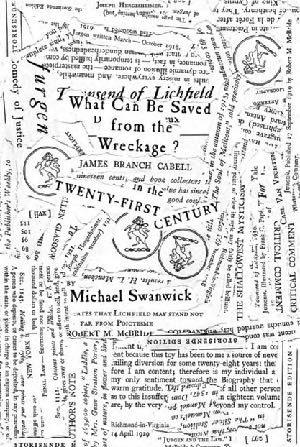
July 2007

29 July 07
Another
peculiar autobiography : The Life of My Choice by
Wilfred Thesiger (1987).
Thesiger (1910-2003) was one of the great explorer authors of the twentieth
century, who walked and photographed and wrote about "adventure among untamed tribes in unknown lands" of
the middle east and Africa. The autobiography records a remarkable
story and expresses Thesiger’s fascination with the land of his birth,
Abyssinia (now Ethiopia).
Journeying at a walking pace under conditions of some hardship, I was perhaps the last explorer in the tradition of the past. I was happiest when I had no communication with the outside world, when I was utterly dependent upon my tribal companions. My achievement was to win their confidence . . . and in so many of my travels, to have been there just in time.
Thesiger’s
account is beautifully written, full of event and savage color, and
demonstrates amply that the author
of Arabian Sands and The Marsh Arabs was a distinguished member of a prominent British military family and one of
the more remarkable figures of the twentieth century. Among British explorers of Arabia, Thesiger is without peer : Philby’s account of his crossing of the Empty Quarter is compelling reading, but Philby also helped bring the automobile to Arabia and, to his horror, lived to see the desert court of Ibn Saud transformed into an entirely different political structure. Thesiger knew himself to be an outsider and who nonetheless persuaded his superior officers to allow him to wander in remote areas. Again and again : in the Sudan, the Tibesti, Syria, Ethiopia ;
and later, after he left the military, in Iraq, Oman, and Kenya.
I have mentioned the evasive character of the autobiographies
of Paul Bowles and Arthur Upfield, the latter
so slippery it was published as a biography. The Life of My Choice is
quite as remarkable for the way Thesiger records the facts and landscapes of
his travels and yet seems to erase his personality from the events. There are
a few instances where the mask slips, and the reader can sense Thesiger’s revulsion
for the twentieth century and his identification with the pre-modern world. An
interesting book.
An afterthought : Thesiger’s attitude to the violence through which he moved
in the early part of his career is frankly uncritical : the voice of the
jubilant survivor ; Thesiger joined the Sudan defence force and served with Orde Wingate during
the Abyssinian campaign in 1941 which restored the exiled Haile Selassie to his
throne. He was awarded a DSO for capturing the fort of Agibar and a garrison
of 2500 Italian troops. "[T]his . . . for
a subaltern, was far beyond my expectations." Something about the account of his experience of irregular warfare in Abyssinia reminded me of the narrative tone of Ernst Jünger’s Auf den Marmorklippen ,
where a clarity of style builds to a cumulative intoxication of bloodthirstiness.
Thesiger would likely have found these remarks incomprehensible.
An interesting book.
What Can
Be Saved from the Wreckage ?
James Branch Cabell in the Twenty-first Century
by
MICHAEL SWANWICK
Forthcoming 1 November
2007 from Temporary Culture, Michael Swanwick’s monograph on the celebrated
Virginia fantasist James Branch Cabell (author of Jurgen ),
with a preface, "Jurgen Down Under", by Barry Humphries.
What Can Be Saved from the Wreckage ? will be published in
an edition of 17 hand bound copies, signed by the authors and with a leaf signed
by James Branch Cabell inserted in each copy. Price to subscribers upon request
from wessells [at] aol [dot] com .
A trade issue of 200 copies in paper
covers will be available at World Fantasy Convention ; advance orders
accepted. Details here.
20
July 07
Shining at the Bottom of the Sea by Stephen Marche (Riverhead
Books, forthcoming in August 2007)
Very interesting and accomplished collection of short stories, ostensibly
an anthology and guide to the literature of the north Atlantic island
republic of Sanjania. In fact Marche creates the history and literary
culture of the island with two dozen stories and critical essays in
a variety of modes and styles, each with a distinct nominal author
(with biographical notes). No pictorial map of Sanjania is given, but
it can almost be envisioned : as if Bermuda, with its mild climate,
were the size of Newfoundland, and if all the expressive varieties
of English creoles of the West Indies had developed in the island’s
many remote coves.
The second half of the book, approaching the modernist and post-colonial
period, is decidely more successful than the early portions of the
national literature, where the stories fail to rise above the level
of pastiche. But in stories such as "The Master’s Dog", "The Ultimate Testament", and "Flotsam and Jetsam", Marche evokes a cohesive culture in opposition to British colonial rule.
Stories such as "Histories of Aenea by Various Things", "A Wedding in Restitution", and "The
Man Friday’s Review of Robinson Crusoe ", offer glimpses of a heterogeneous
contemporary society. There are some Borgesian moments, and the inevitable bibulous
appearance of Hemingway and other ghosts from world literature, but Marche is
at his best in the subtle play of language in the individual stories.
If Sanjania is not as deftly and completely realized as the Mediterranean enclave of Hav,
narrated in the skilful voice of "Dirleddy" Jan Morris in the 1985 and 2006 novels,
Marche demonstrates a remarkable diversity of styles that, equally remarkably,
shape a cohesive picture of the island.
17 July 07
15 July 07 (now slightly revised and expanded)
Dagger
Key and Other Stories by Lucius Shepard. (PS Publishing,
2007). Special Readercon 2007 Edition, limited to 50 copies signed
by the author (wraps).
Great new collection of current work, most at longer story or novella
length,
by the master of
gritty
magical
realism ;
“ Dagger Key ”, a tale of pirates, ghostly hauntings across
the centuries,
and
post-colonial Belize, is original to this volume ; and “ Stars
Seen through
Stone ”, a rock and roll tale set in rural western Pennsylvania,
I had read just the previous week in its appearance in the Magazine
of Fantasy & Science
Fiction . In “ Dagger Key ”, Shepard’s
picture of modern
Belize
contrasts sharply with Avram Davidson’s British Hidalgo ; and the
rich historical allusions of Shepard’s revenant are employed to different
ends than Davidson’s summoning of the restless corpse of Captain Cook in
“ Bloody Man ”.
“ Dead Money ” conflates the New Orleans mob, poker playing,
and zombies, with an interlude in an exotic private island setting as fine as
that of The Hazards of Smith by
H. Bedford-Jones (Hurst & Blackett, n.d. [1924]) ; and where Shepard
takes
this
mix
is provocative and rewarding. If his protagonists tend to be large, heavy-set
competent men
of a certain age, just when the reader suspects the text might sink into Dischism,
Shepard launches his narrative into new territory — again and again.
In addition to the intrinsic interest of such a rich sampling of Shepard’s
work,
this book reminded me of an article, “ New ‘ Taste
and Technique ’ in Science-Fiction ” by
Barry R. Levin (AB Bookman’s Weekly , 21 October 1996), in which
Levin discusses the distinction between uncorrected proofs or advance proofs
(part
of the pre-publication
editorial process) and the varieties of Advance Readers Copies or Special Editions,
etc., formally issued by publishers :
The modern science-fiction collector is interested in acquiring the ‘ true first edition ’ no matter what form the book may take. [. . .] The irony of the modern advance editions is the fact that most of their publishers have no idea that, in the most modern bibliographic sense of the term, they have inadvertently published the ‘ true ’ first editions of their books (with all that implies) in a form not intended. They have in effect preempted their own first editions.
This is indeed the case with Dagger Key , which PS Publishing still list as forthcoming in two larger limitations in hardcover.
11 July 07
The Dog Said Bow-Wow by
Michael Swanwick (Tachyon, forthcoming in Fall 2007).
Excellent new collection from a favorite writer who proceeds from strength
to strength. I especially enjoyed “ The Skysailor’s Tale ”,
a wide-ranging story (new to this collection) with a foot in Philadelphia circa
1820 amid
the rivalries of Biddles and Stephen Girard. The Empire and
its calculus of navigation seem new to fantastical literature ;
certainly where Swanwick takes this superb piece is innovative and compelling.
The story is evocative, the weave of alternate histories rich and sparkly,
the explorations of uncertainty and memory are part of the fabric of the
tale,
and how touching
on the emotional level as well. The banquet for the officers of the Empire is
not to be missed.
And then there are the other tales in the collection, adventures of Darger
and Surplus, Swanwick’s wry and often bawdy take on Faërie or
Elfland, and “ Slow Life ”. In addition to the science
fiction thought experiment of this tale (think first contact and Blish’s
“ How Beautiful with Banners ” [1966] and
a protagonist who survives), there is a brilliant coinage : “ ‘Look,
I don’t buy into any of that touchy-feely Newage ’ — she
deliberately mispronounced the word to rhyme with sewage — ‘stuff.’ ”
recent reading
Things Will Never Be the Same. A Howard Waldrop Reader. Selected Short
Fiction 1980-2005 (Old Earth Books, 2007). What a collection, what
a writer !
The Girlhood of Shakespeare’s Heroines by John Crowley (Subterranean Press, 2005). A deft and complex novella invoking midwestern yearnings in the 1950s, the secret history of free spirits, and the identity of Shakespeare. A milepost in Crowley’s continued preoccupation with American themes his current work in progress, from which I have now heard two readings, is set during the 1940s. This book went o.p. before I heard about it ;
I am pleased now to have a copy.
In Other Words by John Crowley (Subterranean Press, 2006). Collection
of literary essays, including extended pieces on Thomas M. Disch and Robert
Louis Stevenson.
Diamond Dust by Peter Lovesey (Soho, 2002). Police procedural
set in Bristol, Bath, and London, inventive plot but the writing and sense
of place are not quite up to the level of Ian Rankin’s novels of Edinburgh.
He Who Whispers. A Dr. Fell Mystery Story by John Dickson Carr (Harper & Brothers,
1946).
8 July 07
Books, Books, Books
I spent Friday at Readercon 18 in
Burlington, Massachusetts, where I saw old friends, new faces, and also met some
folks with whom I have corresponded. A real pleasure to talk about reading and
writing. I came away with a stack of books and a list of titles to seek out.
I will be posting comments on books as I read them, together with other notes
made during the past few weeks.
The
Yiddish Policemen’s Union by Michael Chabon (Harpercollins,
2007).
Language, chess,
and the integrity of a flawed, persistent man. The experience of reading
Meyer Landsman’s attempts to solve a murder in the Federal District of
Sitka is not unlike first encountering the Los Angeles of Raymond Chandler’s
Philip Marlowe novels ; Chabon has created an imagined past and present for
his novel that are rooted in the forking paths of our own histories. In addition
to its own considerable merits, the novel, as David Streitfeld suggests,
feels like a book by Avram Davidson * : the play of language is subtle and dazzling, as in, for example, the casual reference to the law firm of Foehn, Harmattan & Buran
(with its allusions Alpine, Saharan, and Siberian). The book’s complexities
and ornaments are in utter contrast to the understatement and elusiveness
of Chabon’s The Final Solution. A Story (2004).
* one he could not have written, I think. [note added later]
This creaking and constantly evolving blog of the endless bookshelf : I expect that some entries will be brief, others will take the form of more elaborate essays, and eventually I will become adept at incorporating photos or comments and interactivity. Right now you’ll have to send links to me, dear readers. [HW]
electronym : wessells
at aol dot com
Copyright © 2007 Henry
Wessells and individual contributors.
Produced by Temporary
Culture, P.O.B. 43072, Upper Montclair, NJ 07043 USA.

